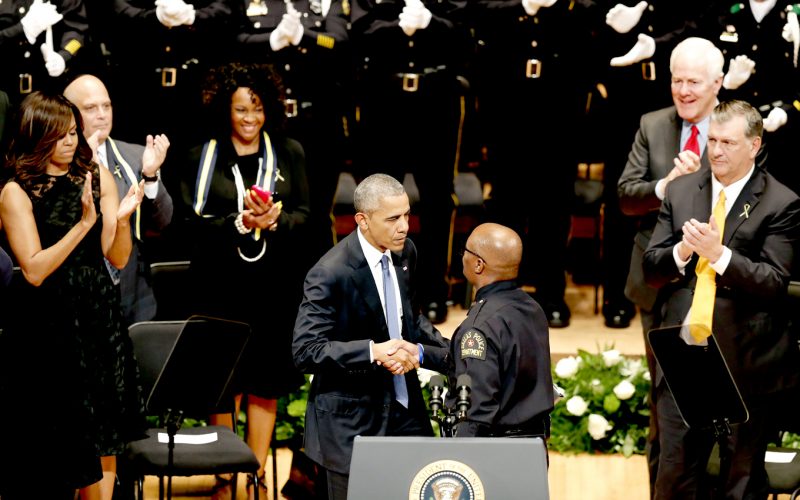
Dallas Police Chief David Brown and President Barack Obama shake hands during a memorial service at the Morton H. Meyerson Symphony Center in Dallas, Tuesday, July 12, 2016. Senate Majority Whip John Cornyn of Texas, and Dallas Mayor Mike Rawlings, right, applaud. Five police officers were killed and several injured during a shooting in downtown Dallas last Thursday night. (AP Photo/Eric Gay)
The inside of Obama’s head must be a fascinating place.
Our first black President, clearly one of the most self-aware and brilliant minds that ever held the office, must not only walk a line between sympathy for black victims of unwarranted police violence and support for the risky work that police must do daily to maintain us as a society of laws, but also make wrenching, complex decisions about how best to put the enormous military forces at his disposal to constructive use in faraway lands.
Further, he presides over a gridlocked congress, subject to an apparent subliminal racism of its own, that has fought him tooth and nail, him and anyone else who thinks a few small gun law reforms might not be a bad idea at this chaotic, bloody moment in our history. At the same time, he meets with subordinates regularly to decide who may be worthy of assassination by drone somewhere in the lawless hinterlands of Afghanistan, Yemen, Syria, Somalia, Libya, Pakistan or Iraq—what some have called extra-judicial murder. Sometimes the cognitive dissonance must be mind-boggling.
Martin Luther King Jr., in his famous Riverside Church speech of 1967, “Beyond Vietnam,” cataloged the ingredients of the toxic brew we must acknowledge and eliminate if we really hope to make America great: rampant racism, materialism, and militarism. America’s original sin, the slave trade and its lingering consequences, is far from resolved. Donald Trump’s rhetoric only drags us back into the dark side of our history, taking us further from the light of resolution.
Racism, materialism, and militarism are closely woven into our culture and with each other. When our militarism seeks out enemies to justify itself, they are frequently non-white (and since World War II—except for some Serbs in 1999—when we actually attack and kill, none are caucasian). Our economic system, rigged to benefit a small number of the privileged, is fatally tied to the manufacture of bombs and fighter planes and missiles and submarines. Material greed is the motivational engine driving the contemptible lobbyists for the gun industry like the NRA and the equally contemptible politicians that lack the courage to pass common-sense gun regulation. The “chickens coming home to roost” element in the Dallas horror is inescapable. The shooter was a veteran who had been deployed to Afghanistan. Instead of trying to capture him alive, perhaps allowing us to learn more about whether his experience abroad affected his mental stability, a “drone” (robot-delivered) bomb was used to blow him up, a tactic associated with the military, never before with police.
One way we have avoided confronting ourselves has been to take on the strange and futile task of playing policeman to the whole world. What hubris gives us the moral authority to play this exalted role? The events of this past week demonstrate how much work we have to do at home before we browbeat the rest of the world into arranging their affairs to suit our interests.
Erik Wilson, the black deputy mayor pro tem of Dallas, spoke the most important words this week: “No conflict has ever been solved with violence,” he told CNN. “It’s always been solved with conversation. And that is something that we need to focus on.”
If this country—if this planet—is to have a future beyond racism, militarism, and materialism, we and our leaders must embrace Erik Wilson’s diagnosis and prescription as something worthy of consistent application at home and abroad. What kind of conversation with each other and with our fellow human beings beyond our borders will give form to a shared vision of peace beyond our own “civil wars” and the endless war on terror? What example could we set here that might help Shia and Sunni, Indians and Pakistanis, Israelis and Palestinians understand that “no conflict has ever been solved with violence?”
There’s a huge upside to our situation: we are a free country; in fact, we are still the hope of the world, as we know because so many millions would give an arm and a leg to come here. We are free to face our pain, anger and fear, and our addiction to violence as the unworkable response to these emotions. We are free to name our challenges honestly, and to find new ways to meet them by deep conversation in our “civil public square.”
Whether we agree or disagree with the specific prescriptions of a candidate like Bernie Sanders, he has exemplified an integrity and moral consistency that speaks to many of us, especially young people. He has touched a longing in us, only intensified by this week’s horrors, to embrace a vision of authenticity and inclusivity beyond the reflexive violence of the wars at home and wars abroad that share all too much in common.
Winslow Myers, syndicated by PeaceVoice, is the author of “Living Beyond War: A Citizen’s Guide” and serves on the Advisory Board of the War Prevention Initiative.



